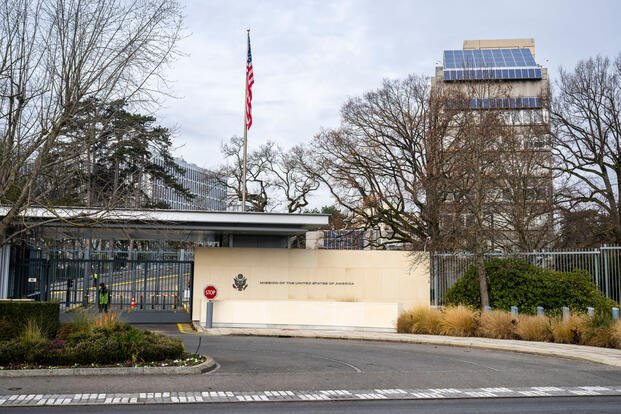Headlines | Military.com
Select Service
My Membership
Read more https://www.military.com/daily-news/headlines/2025/11/24/power-showdown-over-venezuela-strikes.html
Read more https://www.military.com/daily-news/headlines/2025/11/24/power-showdown-over-venezuela-strikes.html

A fight over who controls war powers is unfolding on Capitol Hill as House Democrats move to force a binding vote that could block President Donald Trump from launching or expanding military action in Venezuela without direct authorization from Congress.
The showdown is unfolding as the Trump administration carries out U.S. strikes it says are aimed at cartel and narcotics operations in the Caribbean, causing lawmakers to confront urgent questions about presidential authority, regional stability, and the risk of a wider conflict. Recent activity involving boat strikes[1] and warship movements near Venezuela has raised questions about the administration’s long-term goals and highlighted how quickly the mission could evolve.
“While Democrats and the fake news have joined forces to push nonsense about President Trump’s authority as commander in chief, the president’s actions to halt the scourge of narco-terrorism are consistent with his responsibility to protect Americans and pursuant to his constitutional authority,” White House spokesperson Anna Kelly told Military.com. “All actions comply fully with the law of armed conflict.”
A senior administration official speaking on background said Congress has received briefings regarding the administration’s actions and legal justification. Lawmakers have expressed[2] competing interpretations of the administration’s authority to act in the region.
A new War Powers Resolution introduced by Rep. Jim Himes (D-CT) is aimed at reasserting congressional authority over the use of force.
“We cannot allow any president to unilaterally drag the United States into a conflict,” Himes said in remarks provided to Military.com.
In the Senate, Democrat Andy Kim of New Jersey echoed that position.
“Decisions of war belong with Congress and the American people,” Kim told Military.com. “Transparency and accountability are non-negotiable when American lives and global stability are at stake.”
“Transparency and accountability are non-negotiable when American lives and global stability are at stake.”
Democrats argue the vote is necessary to protect the Constitution and prevent the United States from sliding into an undeclared conflict. Republicans counter that the president has broad authority to act against transnational criminal networks and armed groups that threaten American interests and allies.
Military.com contacted multiple U.S. House Republicans seeking comment on the matter.
The pending vote could force difficult decisions for members in swing districts and in states with major ports, military bases, and trade routes tied to the Caribbean basin.
The Pentagon insists the current mission is limited and legally justified.
“These presidentially directed strikes were conducted against the operations of a designated terrorist organization and were taken in defense of vital U.S. national interests and in the collective self-defense of other nations,” Pentagon spokesperson Kingsley Wilson told Military.com.
Wilson said the strikes took place in international waters and emphasized that no U.S. ground forces were deployed. He said precision targeting and strict rules of engagement were used to reduce risk to civilians and American personnel.
Latin American governments and regional organizations are closely monitoring developments as Washington debates its next move.
The Organization of American States (OAS) urged restraint and stressed the importance of preventing escalation in a region long defined by fragile stability and competing political currents. OAS is the world’s oldest regional organization, operating by four main pillars: democracy, human rights, security and development.
“The Americas remain a zone of peace with no open wars,” an OAS spokesperson told Military.com. “Our shared responsibility is to preserve that peace through dialogue and cooperation.”
Any continued rise in tensions could disrupt energy exports, maritime shipping routes, and regional migration patterns—all of which flow through Caribbean corridors tied to U.S., Latin America and global trade networks.
House leadership is weighing whether to fast-track the War Powers Resolution for a vote. If it passes, the White House could face a direct challenge to its ability to continue or expand military operations without congressional backing.
© Copyright 2025 Military.com. All rights reserved. This article may not be republished, rebroadcast, rewritten or otherwise distributed without written permission. To reprint or license this article or any content from Military.com, please submit your request here[3].
Read more https://www.military.com/daily-news/headlines/2025/11/24/power-showdown-over-venezuela-strikes.html

GENEVA (AP) — Talks between Ukraine and its Western allies on a U.S.-proposed peace plan to end Russia's invasion got underway in Geneva on Sunday, Ukrainian officials said Sunday.
The head of the Ukrainian delegation, presidential chief of staff Andrii Yermak, wrote on social media said that they held their first meeting with the national security advisers from the U.K., France and Germany. The allies have rallied around Kyiv in a push to revise the plan[1], which is seen as favoring Moscow.
U.S. Secretary of State Marco Rubio[2] was expected to join the talks together with Army Secretary Dan Driscoll and President Donald Trump’s special envoy Steve Witkoff.
“The next meeting is with the U.S. delegation. We are in a very constructive mood,” Yermak said. “We continue working together to achieve a lasting and just peace for Ukraine.”
Ukraine’s President Volodymyr Zelenskyy said he was waiting for the outcome of the talks. “A positive result is needed for all of us,” he said.
“Ukrainian and American teams, teams of our European partners —- are in close contact, and I very much hope there will be a result. Bloodshed must be stopped and it must be guaranteed that the war will not be reignited," he wrote in a post on Telegram on Sunday.
Ukraine and allies have ruled out territorial concessionsThe 28-point blueprint[3] drawn up by the U.S. to end the nearly four-year war has sparked alarm in Kyiv and European capitals. Zelenskyy has said his country could face a stark choice[4] between standing up for its sovereign rights and preserving the American support it needs.
The plan acquiesces to many Russian demands that Zelenskyy has categorically rejected on dozens of occasions, including giving up large pieces of territory. The Ukrainian leader has vowed that his people“will always defend” their home.
Speaking before Sunday’s talks, Alice Rufo, France’s minister delegate at the Defense Ministry, told broadcaster France Info that key points of discussion would include the plan’s restrictions on the Ukrainian army, which she described as “a limitation on its sovereignty.”
“Ukraine must be able to defend itself,” she said. “Russia wants war and waged war many times in fact over the past years.”
Speaking to reporters outside the White House on Saturday, Trump said the U.S. proposal was not his “final offer.”
“I would like to get to peace. It should have happened a long time ago. The Ukraine war with Russia should have never happened,” Trump said. “One way or the other, we have to get it ended.”
Trump didn’t explain what he meant by the plan not being his final offer and the White House didn’t respond to a request for clarification.
Rubio's reported comments cause confusionPolish Prime Minister Donald Tusk said Sunday that Warsaw was ready to work on the plan with the leaders of Europe, Canada and Japan, but also said that it “would be good to know for sure who is the author of the plan and where was it created."
Some U.S. lawmakers said Saturday that Rubio had described the plan as a Russian “wish list” rather than a Washington-led proposal.
The bipartisan group of senators told a news conference that they had spoken to Rubio about the peace plan after he reached out to some of them while on his way to Geneva. Independent Maine Sen. Angus King said Rubio told them the plan “was not the administration’s plan” but a “wish list of the Russians.”
A State Department spokesperson denied their account, calling it “blatantly false.”
Rubio himself then took the extraordinary step of suggesting online that the senators were mistaken, even though they said he was their source for the information. The secretary of state doubled down on the assertion that Washington was responsible for a proposal that had surprised many from the beginning for being so favorable to Moscow.
___
Associated Press writers Claudia Ciobanu in Warsaw, Poland and Sylvie Corbet in Paris contributed to this report.
___
Follow AP’s coverage of the war in Ukraine at https://apnews.com/hub/russia-ukraine[5]
© Copyright 2025 Associated Press. All rights reserved. This material may not be published, broadcast, rewritten or redistributed.